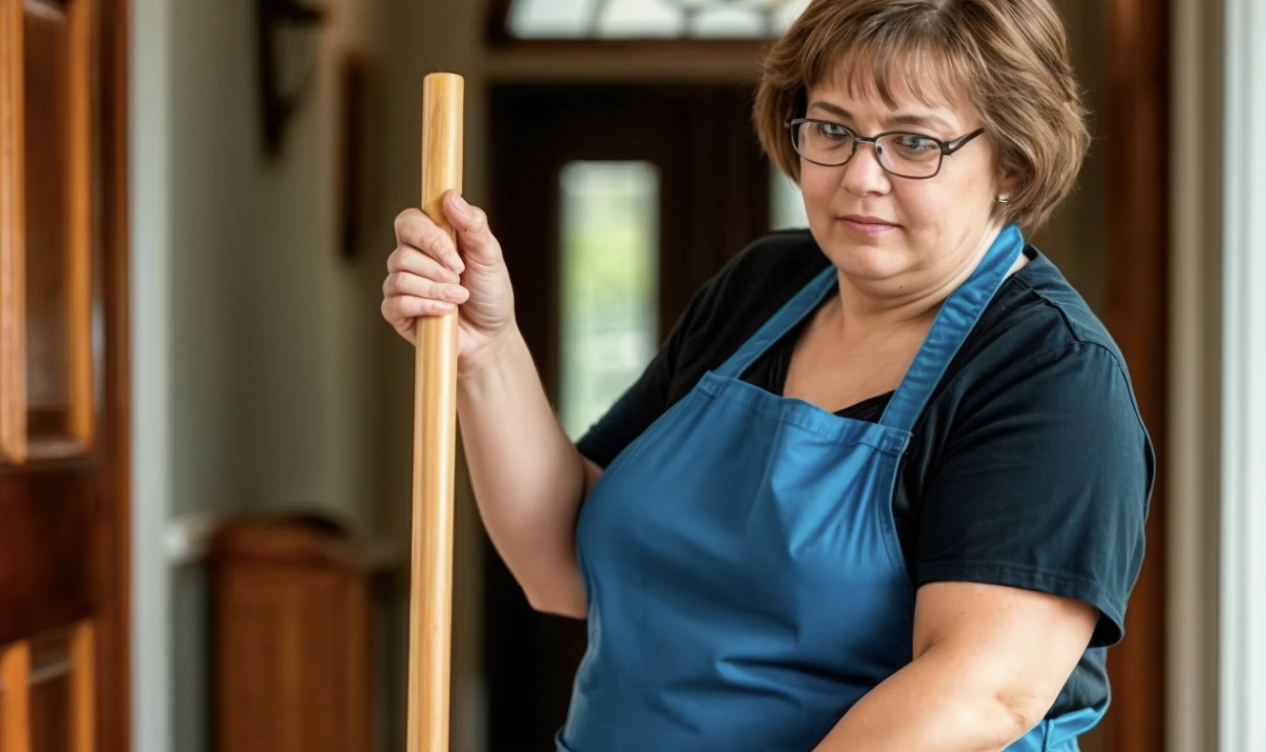Every evening, like clockwork, Olya performed a bedtime ritual for her daughter—five-year-old Oksana, a little girl with huge doll-like eyes and a heart full of childhood dreams. But this time, putting her to bed turned into a battle: Oksana squirmed, fidgeted, pushed the blanket away, and suddenly, with a serious expression, whispered:
— Mom, tell me about dad. The one I don’t remember.
Olya’s heart clenched as if someone pressed a palm against her chest. She took a deep breath, trying to keep the tears from spilling out. Silence filled the room, broken only by the ticking of the old clock on the wall and the sound of cars passing outside.
— Your dad, — she began slowly choosing her words as if afraid to shatter a fragile memory, — was a real hero. He was a climber, but not just any climber—he worked on high-rise construction sites, where every step was a battle with the wind, fear, and the abyss beneath his feet. He climbed to the very tops of buildings, where even birds are afraid to fly. He was strong, brave, and every time he came home, he hugged you tightly as if afraid you might disappear. He called you his little princess. He said you were the light of his life, his greatest achievement.
Oksana froze, listening. Her eyes sparkled like stars in the night sky. She didn’t ask why her dad was gone. She didn’t ask how he left. But Olya knew—she knew everything. And that knowledge was heavier than any stone tied to her heart.
Her husband, Grigory, had died two years ago. Not because of an accident, not because of his own mistake. The system killed him. Cost-cutting. Cold, heartless budget cuts on the construction site. His safety rope was worn out, and they didn’t give him a new one—“everything is on schedule.” But the schedule didn’t wait. Grisha fell from the 17th floor. He was only thirty. His whole life ahead. Dreams, plans, a promised vacation at the sea for his daughter… Everything ended in an instant. And now he couldn’t be brought back. No money, no tears could change that.
Olya lay down on the nearby bed, tired not only physically but in her soul. The room was small, cramped, with peeling paint on the walls and an old wardrobe that creaked with every movement. But this was their home. Their only shelter in this cruel world. She tossed and turned trying to find peace, but memories wouldn’t let go. Faces of her parents appeared before her eyes—people she once loved but who chose alcohol over family. They drank until they destroyed themselves. Olya ran to them, begged, brought food, medicine, cried at their door. But they didn’t care. Not even their granddaughter interested them. They looked at her like a stranger. And when they died—one after another, in poverty and loneliness—the apartment went to Olya. Not as an inheritance of love, but as a reminder of pain. After an hour of torturous thoughts, she finally fell asleep as if falling into a deep, dark pit.
Morning began with panic. The alarm clock didn’t go off. Olya woke up late, heart pounding wildly. She jumped up, shook Oksana awake, pulled on her uniform—not new, but clean and neatly ironed. Olya had bought the clothes secondhand at a cheap market, saving every kopeck. She dreamed of buying her daughter something beautiful, fashionable, but that was still just a dream. Fortunately, they had Ekaterina Arkadyevna—the neighbor, an angel in the form of an elderly woman. She picked up Oksana from school, took her to the park, read her stories, played dolls, and most importantly, always supported them. Without her, Olya wouldn’t have survived. Not just wouldn’t have coped—she would have disappeared. Vanished into this gray, cruel reality.
At work—in a discount store—Olya was just a “cleaner.” A janitor. People like her were looked down upon. The colleagues—especially the saleswomen—looked at her with disdain. Nadya, sly as a fox, with bright lipstick and eyes that knew how to lie, constantly mocked:
— Here you come again, like from the dump? Cleaner, but looks like a queen!
Toma, another saleswoman, envied Olya—her thick braid, slim waist, modesty, even the way she silently walked by, avoiding gossip. Jealousy pulsed in every look.
But worst of all was what Olya saw: customers were constantly being cheated. Nadya skillfully shortchanged them, pocketing extra hundreds. She came from the provinces, dreaming of marrying a rich man and “living off him,” as she said herself. Work was just a stepping stone to a luxurious life for her.
And Olya—honest, quiet, hardworking—was an outsider to them. The perfect target for mockery.
On Monday, everything went wrong. A regular customer—a rude, arrogant man who always found a reason to humiliate Olya—came into the store. Today, he deliberately stepped on the freshly mopped floor, leaving dirty footprints. Then, with a smirk, demanded:
— Give me the complaint book. I’ll write that the cleaner is useless.
Nadya and Toma exchanged glances, barely suppressing laughter, and handed him the book immediately. Olya felt the blood drain from her face. If the manager found out about the complaint, she’d be fired. And where would she find a new job? With a daughter? Debts? A past dragging her down like a stone?
After her shift, she went to pick up Oksana. But at Ekaterina Arkadyevna’s door, horror awaited her: the girl sat, burying her face in her knees, crying, trembling.
— Everyone is laughing! — sobbed Oksana. — They say I’m poor! That my uniform is old! That I’m a beggar!
Olya felt everything inside her break. She held her daughter close, stroked her head, whispered:
— You’re not poor. You’re the most beautiful, the smartest, the best.
Ekaterina Arkadyevna immediately intervened:
— How dare they laugh?! Oksana is always clean, neat, well-behaved! Don’t listen to them, dear!
But Olya realized: it couldn’t go on like this. The next day she went to the school. Luckily, it was a day off.
First, she spoke with the class teacher. She sighed and shrugged:
— I’m powerless. The new principal—Vyacheslav Ivanovich—makes all the decisions. You have to talk to him.
The principal’s office smelled of expensive perfume and power. He sat in his chair like a king on a throne, in a flawless suit, with golden cufflinks. Olya told him about the bullying, the children, her daughter’s tears. He just coldly smirked:
— Did you contribute money for the school repairs?
— What?! — Olya couldn’t believe it. — What does that have to do with it? My daughter is being humiliated! And you talk about money?
— If you want her to be treated well, — he said, — start participating in school life. Until then—you are nobody.
Olya left there with a broken heart. She returned to the neighbor and, unable to hold back, burst into tears. Ekaterina Arkadyevna listened, was silent, then stood up, went to the wardrobe, and took out an old piggy bank—a porcelain pig filled with coins.
— Take it, — she said firmly. — This is not a loan. This is help. Pay back when you can.
— No! I can’t! — Olya cried out.
— You can. For your daughter’s sake, you can do anything.
The next day at school it got even worse. Teachers started giving Oksana low grades. Even in behavior. As if the girl was guilty for not having a father. For having a mother who was a cleaner.
And then, on the way home, Olya saw him—a small, trembling puppy hiding under a bench. He looked at her with eyes full of plea. Olya couldn’t resist. She took him home. Oksana screamed with joy. For the first time in a long time, her face shone.
But that evening, scrolling through social media, Olya saw an announcement: “Lost dachshund puppy. Name—Mukhtar. Reward for return.” Her heart sank. She dialed the number. An hour later, a call came.
At the door stood a man about sixty, in a strict coat, with kind but tired eyes. He introduced himself: Eduard Borisovich. Businessman. Father. Father of the deceased son. Mukhtar was his last gift. A memory.
— Thank you for finding him, — he said quietly. — But I must take him back.
Oksana cried. Olya stood there, not knowing what to do. Then Eduard Borisovich looked at the girl, at her tears, at the mother, and suddenly said:
— Let him stay. Let him live with you. And you… why are you so sad?
And Olya told him. Everything. About work, school, the principal, the cruelty of the world. She spoke as if spitting out years of pain.
Eduard Borisovich listened silently. Then nodded:
— I will help.
The next day, at the parent meeting, he came into the classroom—tall, confident, with a wad of money in his hand. Everyone went silent. The principal jumped up:
— What do you think you’re doing?
— This is for repairs, — hissed the businessman, throwing the wad on the desk. — Is it enough? Or do you need more? Now leave the child alone.
Silence. Teachers’ faces reddened. The principal turned pale. Someone filmed it all on their phone. The video went viral. The very next day, Vyacheslav Ivanovich was fired. In disgrace.
Olya cried. Tears of happiness. Relief. Because there is still justice in the world.
She sincerely thanked Eduard Borisovich. They started communicating. He visited, played with Oksana, called her his granddaughter. He admitted:
— I never had grandchildren. Now I’ve found the very best one.
And one day he offered Olya a job—in his office. Not as a cleaner. As an administrator. With a decent salary, vacation, insurance.
— You deserve it, — he said.
The puppy found under the bench became a symbol of a new life. A chance meeting led to a miracle. And in this world full of injustice, sometimes a miracle happens—if you don’t give up, if you believe, if you love.


